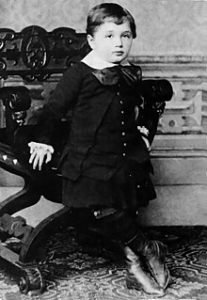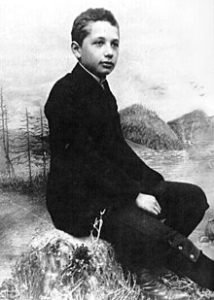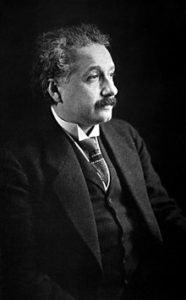A Truly Beautiful Mind
Introduction
This lesson gives us a brief life history of a great scientist – Albert Einstein. As a child, he had no signs of greatness .His mother thought that he was a freak. When he started speaking, he spoke everything twice. He was boring for other children .So he played by himself much of the time. The headmaster told her father that Einstein would never make a success at anything. But later in life, he proved as a scientific genius. In 1915, he published his General Theory of Relativity, which provided a new interpretation of gravity. His work was considered a “scientific revolution.”
Albert Einstein




Image Reference: en.wikiquote.org
Summary
Albert Einstein was born on 14th March, 1879 in the German city of Ulm. His mother thought he was a freak and his head was too large. He didn’t speak until the age of two-and-a-half. When he finally started speaking, he uttered everything twice. He loved mechanical toys and preferred being by himself.
Once the headmaster told his father that he would never make a success at anything. Einstein began learning to play the violin at the age of six. He later became a gifted amateur violinist, maintaining this skill throughout his life.
Einstein hated the school’s regimentation, and often clashed with his teachers. At the age of 15, Einstein felt so stifled there that he left the school for good.
Einstein was highly gifted in mathematics and interested in physics, and after finishing school, he decided to study at a university in Zurich. In 1900, at the age of 21, Albert Einstein was a university graduate and unemployed. He worked as a teaching assistant, gave private lessons and finally secured a job in 1902 as a technical expert in the patent office in Bern.
Albert fell in love with Mileva Maric and wanted to marry her after finishing his studies, but his mother was against it. She thought Mileva was three years older than her son. The pair finally married in January 1903 and had two sons. But a few years later, the marriage faltered. After years of constant fighting, the couple finally divorced in 1919. Einstein married his cousin Elsa the same year.
In 1915, he had published his General Theory of Relativity, which provided a new interpretation of gravity. An eclipse of the sun in 1919 brought proof that it was accurate. His work was considered a “scientific revolution.”
He died in 1955 at the age of 76. He was known and celebrated as a visionary and world citizen as much as a scientific genius
Short and Long Answer Type Questions
Q. Who had these opinions about Einstein?
(a) He was boring.
Ans. Einstein’s playmates said he was boring.
(b) He was stupid and would never succeed in life.
Ans. A headmaster said to Einstein’s father.
(c) He was a freak.
Ans. Einstein’s mother thought he was a freak.
Q. Explain what the reason for the following are:
(a) Einstein leaving the School in Munich for good.
Ans. Einstein was a good student. But he did not like the strict discipline in the School at Munich. He often clashed with his teachers so he decided to leave the School in Munich forever.
(b) Einstein leaving to study in Switzerland rather than in Munich.
Ans. Einstein wanted to study in Switzerland because it was more liberal than Munich.
(iii) Einstein seeing in Mileva an ally.
Ans. Einstein opposed the uncultured people both at home and university. He found that MILEVA had similar views.
(iv) What do these tell you about Einstein?
Ans. All these things shows that Einstein was a liberal and cultured person. He loved freedom He did not like orthodox views.
Q. Who is a genius? What qualities do you think a genius has?
Ans. A genius is a person with exceptional intellectual or creative abilities. He works patiently and with great concentration. He is imaginative and solves problems with an open mind. He is a versatile person who is not only perfect in his field of work but also devotes energy towards bettering the society.
Q. What did Einstein call his desk drawer at the patent office? Why?
Ans. Einstein jokingly called his desk drawer the bureau of theoretical physics. He called it so because he was using it to develop his own theories of relativity.
Q. Why did Einstein write a letter to Franklin Roosevelt?
Ans. Einstein wrote a letter to the President of America Franklin Roosevelt to warn him about the effect of bomb and also wanted them to utilize its destruction potential for the welfare of the mankind.
Q. How did Einstein react to the bombing of Hiroshima and Nagasaki?
Ans. Einstein was deeply shaken by the disaster in the Hiroshima and Nagasaki. He wrote a public missive to the United Nations. He proposed the formation of a world government to stop the nuclear weapons.
Q. Why does the world remember Einstein as a “world citizen”?
Ans. Einstein agitated for an end to the arms buildup and used his popularity to campaign for peace and democracy. That’s why he is remembered as a “world citizen”.
Q. Here are some facts from Einstein’s life. Arrange them in chronological order.
Ans. 1. Einstein is born in the German city of Ulm.
2. Einstein attends a high school in Munich.
3. Einstein’s family moves to Milan.
4. Tired of the school’s regimentation, Einstein withdraws from school.
5. Einstein joins a university in Zurich, where he meets Mileva.
6. He works in a patent office as a technical expert.
7. Einstein publishes his special theory of relativity.
8. He provides a new interpretation of gravity.
9. He is awarded the Nobel Prize in Physics.
10. When Hitler comes to power, Einstein leaves Germany for the United States.
11. Einstein writes a letter to U.S. President, Franklin D. Roosevelt, and warns against Germany’s building of an atomic bomb.
12. Einstein dies.
———xxXxx———
